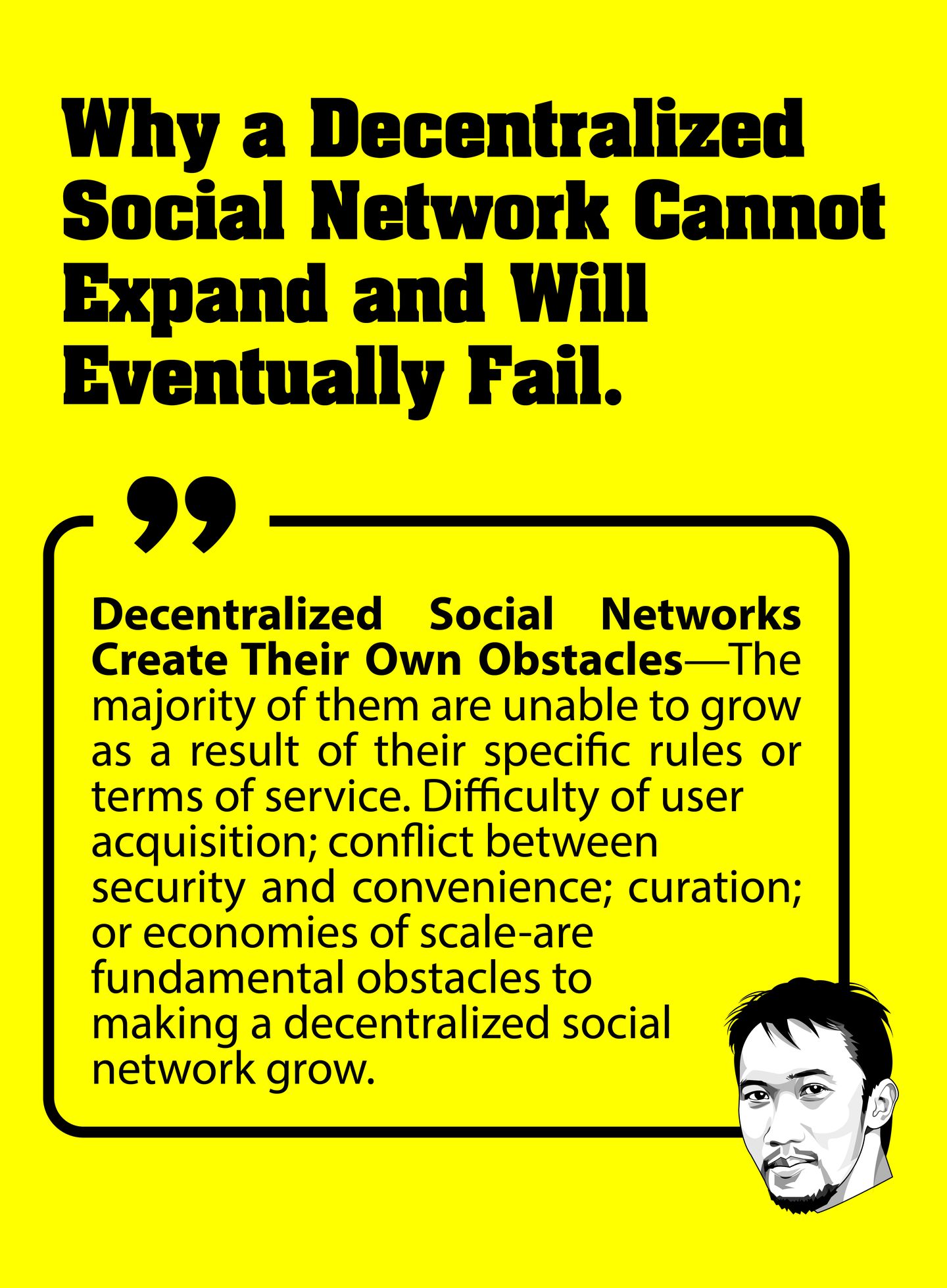Will The Well-Liked Centralized Social Network be Replaced by a Decentralized One?

Decentralized networks are ineffective, but they should not be abandoned. The main issue is that it would be non-profit, so there would be less incentive to build it if no one invested in it. That means they can't develop on their own. Then competition matters, even when it seemingly doesn't, because all of them will raise their brand, obviously.
Even if smaller, decentralized platforms can provide innovation and gain short-term success in terms of user numbers, it doesn’t guarantee long-term success. I think that decentralized social network projects should rely on existing standards and help with their development.
Difficult Tools for Users—The tools available to users are limited and difficult to employ. People will continue to prefer centralized social networks like Facebook, Twitter, Instagram, WordPress, Blogger, and others. They should provide something simple and reliable enough to compete with doing almost no work to use and maintain, similar to Facebook. Furthermore, it must have at least as many features as Tools like Diaspora encountered difficulties attracting a permanent user base, and it’s likely new platforms will, too.
Steemit is notoriously difficult to understand, and this can be frustrating. Even many people struggle to explain how it works. The fact is that this is not the most user-friendly site around, and some people quit almost immediately because of it. Some people want something easy to navigate and pretty to look at, and Steemit is not that kind of site.
Difficult Barrier of Entry—It can be a nightmare to understand how the platform works and how the money is distributed. This can turn off a lot of newbies.
Freedom Isn't Free—It costs a little bit of cryptocurrency or more to use a decentralized social network. There is a price to pay for free speech. Most of their campaigns—FREE, privacy, freedom of speech, transparency, and decentralization—but actually not.
The user needs to buy the community coin for fees to power the community platform. Users need to have a premium account and pay some money to unlock some features.
To use Diaspora, you need to spend a little bit of money or maybe more, in the name of donation, before you can join the community.
To use a decentralized social network, you need to buy the community coin for network fees in the name of helping secure your data. You may see this on Peepeth. Every action on your account has its cost. Following other people has its cost. Deleting your post will cost money, etc.You will not see any price list at the beginning. It feels like a hidden fee; it looks free at the beginning, but eventually not.
So, freedom is still for the rich people who are able to buy the community coin, and they will become popular, but the poor people will never have the freedom to become popular.
But business is business. We realized they needed lots of money to survive and grow. Facebook is totally free, but they make a lot of money from selling our data.
Security Over Complexity—A security measure that can become a big disadvantage in case you forget your password. All of the decentralized platforms do not have a password recovery option. Adhering to privacy and security ideals sometimes requires complexity.
Unknown Future of Decentralized Social Network—If the platform goes extinct, so will your account and content.
Transparency Ignoring Privacy—Many decentralized social networks focus on transparency. People can see others coin transactions, edit status or post history, and most users activity can bee seen by other users. The bad thing is no privacy settings on their platform.
Language Translation Problems—The posts are not translated, and most decentralized social networks do a poor job of managing different languages.
Lack Incentives for Advertisers—Decentralized social media platforms haven’t found an alternative way to monetize attention. They don’t rely on data mining, so users don’t receive targeted ads. Centralized platforms do collect user data and deliver targeted ads; they can generate revenue based on view counts and click-throughs.
Lack Incentives for Content Creators—Some platforms give you the opportunity to monetize your social network to earn some money. Some platforms won't let you monetize for free; you need to be a premium member. Most of them use tokens to encourage people to contribute to their community. Which means you need to spend your money before you earn some money.
Almost all decentralized social media platforms often create their own cryptocurrencies to pay content creators rather than using more widely accepted, liquid cryptocurrencies. This means content creators can’t easily sell their earnings on exchanges. Thus, centralized platforms have an advantage over decentralized platforms, even if they take a huge portion of the fees as a middleman.
The Community Token as the Other Obstacle—Although Bitcoin started as a non-profit (obviously not technically, the point is, cryptocurrencies allow you to leverage and trade value created without real money), they only make sense for certain use cases. In this case, the token would have to serve some sort of useful function related to the social network. The users need to transfer their token to a local exchange and then convert it into their local currency. The above process might be complex for a beginner.
Monetizing in decentralized social networks is still nascent and in its early stages. It is linked with crypto payments, which involves a risk. The value could change over a second. Cryptocurrency Is Unpredictable: With this kind of currency, nothing is guaranteed. From a financial standpoint, anything to do with cryptocurrency is fraught with risk. But it is definitely a revolution for content creators who get paid for the content they are posting. If you’re one of those people who put in thousands and expect some kind of passive income from a decentralized social network, you won’t get rekt. Overall, the biggest barrier might be how to reach audiences that aren’t crypto natives.
3 comments